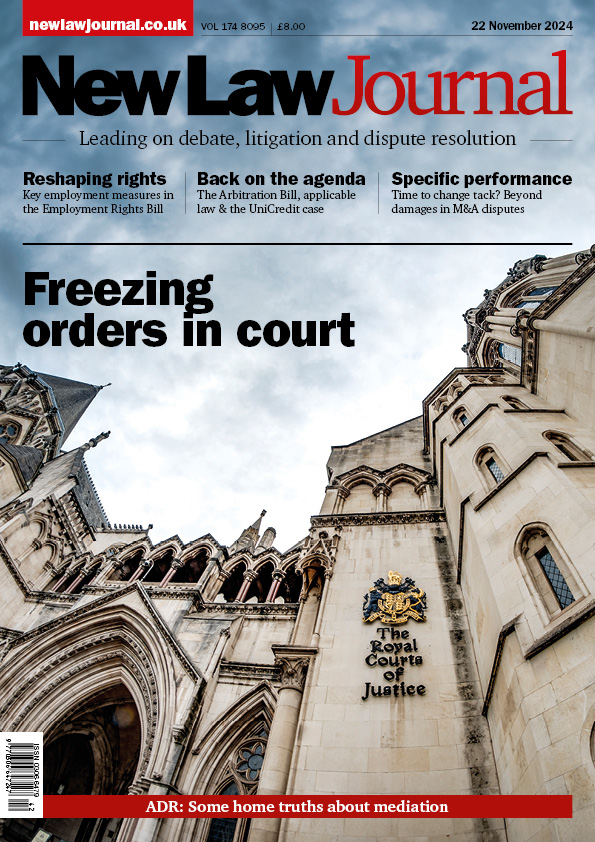THIS ISSUE

Freezing injunctions are 50 years old next year and still very much a developing area of law. In this week’s NLJ, Mary Young, partner, and Charlotte Dormon, associate, in the dispute resolution team at Kingsley Napley, take us through a raft of cases decided this year.
Should an immoral regime rise to power, it is tempting to think lawyers and the rule of law would act as a protective wall. But is this true? Sadly, history suggests not, as John Gould, chair of Russell-Cooke, writes in this week’s NLJ.
Retired costs judge John O’Hare discusses ADR in three contexts, in this week’s NLJ. He covers cases provisionally allocated to the small claims track, commercial litigation in the County Court, and claims opposed by liability insurers or by large self-insuring organisations such as local authorities or health authorities.
Ambiguity over the governing law of arbitration agreements continues to spark debate. In July, meanwhile, the government reintroduced the Arbitration Bill, which would have altered the outcome in September of the Supreme Court case, UniCredit. In this week’s NLJ, Valya Georgieva, senior associate, Penningtons Manches Cooper, and Ravi Aswani, barrister, 36 Group, examine the court’s reasoning and consider how the outcome might have differed if the Arbitration Bill, currently before Parliament, had been in force.
The remedy of ‘specific performance’ is little-used but can be ‘extremely beneficial’ in M&A disputes. In this week’s NLJ, Yasseen Gailani, partner, and Megan Hiluta, senior associate, Quinn Emanuel, explain why looking beyond the remedy of damages may pay dividends for clients.
In a system ruled by immoral leaders, it may be fanciful to believe that lawyers can or will make a difference: John Gould considers a chilling lesson from history
Even after five decades of freezing injunctions, the courts are still regularly asked to clarify the law: Mary Young & Charlotte Dormon round up this year’s causes of confusion
Charles Pigott outlines key employment measures contained within the government’s Employment Rights Bill
Yasseen Gailani & Megan Hiluta consider the advantages of the little-used remedy of ‘specific performance’
The Arbitration Bill is back on the agenda—but how would it have affected the outcome of the UniCredit case? Valya Georgieva & Ravi Aswani consider the implications
MOVERS & SHAKERS

Keystone Law—Milena Szuniewicz-Wenzel & Ian Hopkinson
International arbitration team strengthened by double partner hire

Coodes Solicitors—Pam Johns, Rachel Pearce & Bradley Kaine
Firm celebrates trio holding senior regional law society and junior lawyers division roles

Michelman Robinson—Sukhi Kaler
Partner joins commercial and business litigation team in London
NEWS
The government has pledged to ‘move fast’ to protect children from harm caused by artificial intelligence (AI) chatbots, and could impose limits on social media as early as the summer
All eyes will be on the Court of Appeal (or its YouTube livestream) next week as it sits to consider the controversial Mazur judgment
An NHS Foundation Trust breached a consultant’s contract by delegating an investigation into his knowledge of nurse Lucy Letby’s case
Draft guidance for schools on how to support gender-questioning pupils provides ‘more clarity’, but headteachers may still need legal advice, an education lawyer has said
Litigation funder Innsworth Capital, which funded behemoth opt-out action Merricks v Mastercard, can bring a judicial review, the High Court ruled last week







